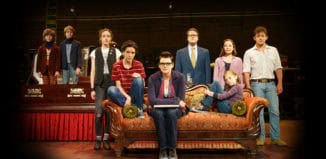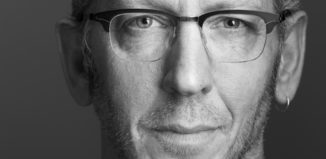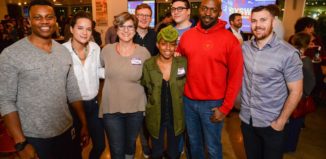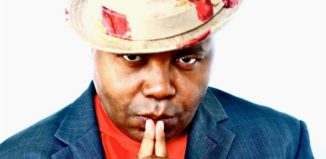Cassie Campbell and Jackie Garrett both joined the Austin Police Department (APD) after working in smaller departments—Garrett in Waco and Campbell from Burnet County. Both recall the relief and happiness they felt at discovering they could be openly out among their colleagues at the APD.
“Coming here, I didn’t know how comfortable I’d be,” Garrett said of her transition to the APD in the late ‘90s. “I came from the Waco police, and I wasn’t out there. A coworker in victims services [in the APD], who was hired right before me, she was out, so I watched to see how she was accepted. No one cared, and it was great.”
Finding that level of acceptance led both of them to join the Lesbian & Gay Peace Officer’s Association (LGPOA), a nonprofit organization that supports LGBT members of the APD. Members include sworn, retired and civilian members of the department. Campbell works as a communications lead, which means she oversees dispatchers, and Garrett is a lead counselor with the victims services crisis team. While they work as employees of the APD, both are technically civilians.
The organization’s goal is to provide a voice for equality and use education to break negative stereotypes. The LGPOA also actively reaches out to the community, particularly LGBT and questioning youth, to build a positive relationship.
For anyone who remembers Stonewall, it may come as a bit of a shock to see that kind of alliance between a police department and the LGBT community.
The LGPOA is the first and only organization of its kind in Texas, said Steven McCormick, president of the LGPOA and Senior Police Officer with the APD, although several agencies do have liaison officers to the LGBT community and others have small social organizations for LGBT officers.
Nationally, the Gay Officers Action League (GOAL) and Law Enforcement of Gays and Lesbians (LEGAL) have several chapters and hold conferences.
Garrett and Campbell can testify to the importance of the organization, both as a way to feel included and welcomed for who they are and as an outreach to the Austin LGBT community.
“All of us want to associate with people, see people who are like us,” Garrett said. “Sometimes it’s nice to see other people here like me, who know what I’m going through. This group is our comfort.”
The LGPOA, which has about 75 members, makes a point to serve as role models for LGBT youth and build strong relationships in the LGBT community.
To that end, the organization made a seven-minute video for the “It Gets Better” project and is planning a second video that will be out this fall. LGPOA’s members also participate in Habitat for Humanity’s Pride Build, support OutYouth and march in the PRIDE parade. Last Christmas, LGPOA members used the money that came from member dues to buy presents for the family of Norma Hurtado, who, along with her mother, was murdered by Hurtado’s girlfriend’s father.
“We’ve also discussed offering a scholarship to a gay or lesbian student doing something in the community to make a difference and provide them with a small scholarship to help them with their education,” Campbell said.
Both women know how much that support can mean to a young LGBT person.
Campbell recalls sitting with her mother in their home in a small town. “She was talking about a friend of hers whose son was coming out as gay. She said, ‘I don’t know what I would do if I found out that you were gay.’ I just remember that, that was her telling me that would be her response to me coming out. I knew I could never tell my mother. I couldn’t carry that guilt. There was no way I’d ever come out to her.”
Garrett, who came from a Baptist family and went to Baylor University, struggled with discrimination at Baylor before even coming out. The school threatened to kick her out and her sorority asked her to step down as a pledge trainer. When her mother finally asked her if she was gay, Garrett said she was tired of lying and told her the truth
Despite their rocky coming-out periods, both women have mended relationships with their families. And now they have the support of coworkers, too.
“One of our goals as an organization is to let the community know that the APD is supportive of the LGBT community,” Campbell said. “And that it’s not necessarily what you are, or who you are, but that you’re a person in the community.”





































